 A Liberian burial team wearing protective clothing retrieves the body of a 60-year-old Ebola victim from his home on August 17 near Monrovia, Liberia. Health officials say the current Ebola outbreak in West Africa is the deadliest ever.
A Liberian burial team wearing protective clothing retrieves the body of a 60-year-old Ebola victim from his home on August 17 near Monrovia, Liberia. Health officials say the current Ebola outbreak in West Africa is the deadliest ever.  lija Siafa, 6, stands in the rain with his sister Josephine, 10, while waiting outside the new Doctors Without Borders (MSF) Ebola treatment center on August 17 in Monrovia, Liberia. The newly built facility will initially have 120 beds, making it the largest such facility for Ebola treatment and isolation in history.
lija Siafa, 6, stands in the rain with his sister Josephine, 10, while waiting outside the new Doctors Without Borders (MSF) Ebola treatment center on August 17 in Monrovia, Liberia. The newly built facility will initially have 120 beds, making it the largest such facility for Ebola treatment and isolation in history.  Doctors Without Borders staffer Brett Adamson hands out water to sick Liberians hoping to enter the new Ebola treatment center on August 17.
Doctors Without Borders staffer Brett Adamson hands out water to sick Liberians hoping to enter the new Ebola treatment center on August 17.  Workers prepare the new Doctors Without Borders Ebola treatment center on August 17.
Workers prepare the new Doctors Without Borders Ebola treatment center on August 17.  A body, reportedly a victim of Ebola, lays on a street corner in Monrovia, Liberia on August 16.
A body, reportedly a victim of Ebola, lays on a street corner in Monrovia, Liberia on August 16.  Liberian police depart after firing shots in the air while trying to protect an Ebola burial team in the West Point slum of Monrovia on August 16, 2014. A crowd of several hundred local residents reportedly drove away the burial team and their police escort. The mob then forced open an Ebola isolation ward and took the patients out, many saying that the Ebola epidemic is a hoax.
Liberian police depart after firing shots in the air while trying to protect an Ebola burial team in the West Point slum of Monrovia on August 16, 2014. A crowd of several hundred local residents reportedly drove away the burial team and their police escort. The mob then forced open an Ebola isolation ward and took the patients out, many saying that the Ebola epidemic is a hoax.  A crowd enters the grounds of an Ebola isolation center in the West Point slum in Monrovia, Liberia, on August 16, 2014 . The mob was reportedly shouting, "No Ebola in West Point." The center, a closed primary school originally built by USAID, was being used by the Liberian Health Ministry to temporarily isolate people suspected of carrying the virus.
A crowd enters the grounds of an Ebola isolation center in the West Point slum in Monrovia, Liberia, on August 16, 2014 . The mob was reportedly shouting, "No Ebola in West Point." The center, a closed primary school originally built by USAID, was being used by the Liberian Health Ministry to temporarily isolate people suspected of carrying the virus.  A health worker disinfects a corpse after a man died in a classroom being used as an Ebola isolation ward Friday, August 15, in Monrovia, Liberia. The virus has killed more than 1,000 people this year in Guinea, Liberia, Nigeria and Sierra Leone.
A health worker disinfects a corpse after a man died in a classroom being used as an Ebola isolation ward Friday, August 15, in Monrovia, Liberia. The virus has killed more than 1,000 people this year in Guinea, Liberia, Nigeria and Sierra Leone.  A boy tries to prepare his father before they are taken to an Ebola isolation ward August 15 in Monrovia.
A boy tries to prepare his father before they are taken to an Ebola isolation ward August 15 in Monrovia.  Kenyan health officials take passengers' temperature as they arrive at the Jomo Kenyatta International Airport on Thursday, August 14, in Nairobi, Kenya.
Kenyan health officials take passengers' temperature as they arrive at the Jomo Kenyatta International Airport on Thursday, August 14, in Nairobi, Kenya.  A hearse carries the coffin of Spanish priest Miguel Pajares after he died at a Madrid hospital on Tuesday, August 12. Pajares, 75, contracted Ebola while he was working as a missionary in Liberia.
A hearse carries the coffin of Spanish priest Miguel Pajares after he died at a Madrid hospital on Tuesday, August 12. Pajares, 75, contracted Ebola while he was working as a missionary in Liberia.  A member of the Centers for Disease Control and Prevention leads a training session on Ebola infection control Monday, August 11, in Lagos, Nigeria.
A member of the Centers for Disease Control and Prevention leads a training session on Ebola infection control Monday, August 11, in Lagos, Nigeria.  Health workers in Kenema, Sierra Leone, screen people for the Ebola virus on Saturday, August 9, before they enter the Kenema Government Hospital.
Health workers in Kenema, Sierra Leone, screen people for the Ebola virus on Saturday, August 9, before they enter the Kenema Government Hospital.  A health worker at the Kenema Government Hospital carries equipment used to decontaminate clothing and equipment on August 9.
A health worker at the Kenema Government Hospital carries equipment used to decontaminate clothing and equipment on August 9.  Health care workers wear protective gear at the Kenema Government Hospital on August 9.
Health care workers wear protective gear at the Kenema Government Hospital on August 9.  Paramedics in protective suits move Pajares, the infected Spanish priest, at Carlos III Hospital in Madrid on Thursday, August 7. He died five days later.
Paramedics in protective suits move Pajares, the infected Spanish priest, at Carlos III Hospital in Madrid on Thursday, August 7. He died five days later.  Nurses carry the body of an Ebola victim from a house outside Monrovia on Wednesday, August 6.
Nurses carry the body of an Ebola victim from a house outside Monrovia on Wednesday, August 6.  A Nigerian health official wears protective gear August 6 at Murtala Muhammed International Airport in Lagos.
A Nigerian health official wears protective gear August 6 at Murtala Muhammed International Airport in Lagos. 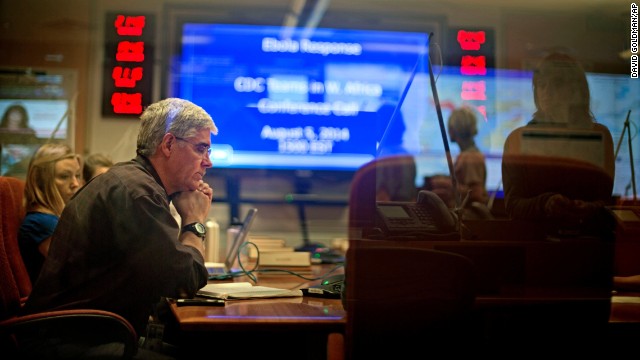 Officials with the Centers for Disease Control and Prevention in Atlanta sit in on a conference call about Ebola with CDC team members deployed in West Africa on Tuesday, August 5.
Officials with the Centers for Disease Control and Prevention in Atlanta sit in on a conference call about Ebola with CDC team members deployed in West Africa on Tuesday, August 5.  Aid worker Nancy Writebol, wearing a protective suit, gets wheeled on a gurney into Emory University Hospital in Atlanta on August 5. A medical plane flew Writebol from Liberia to the United States after she and her colleague Dr. Kent Brantly were infected with the Ebola virus in the West African country.
Aid worker Nancy Writebol, wearing a protective suit, gets wheeled on a gurney into Emory University Hospital in Atlanta on August 5. A medical plane flew Writebol from Liberia to the United States after she and her colleague Dr. Kent Brantly were infected with the Ebola virus in the West African country.  Nigerian health officials are on hand to screen passengers at Murtala Muhammed International Airport on Monday, August 4.
Nigerian health officials are on hand to screen passengers at Murtala Muhammed International Airport on Monday, August 4. 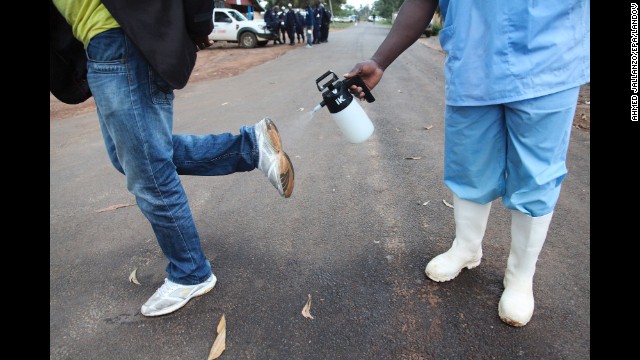 A man gets sprayed with disinfectant Sunday, August 3, in Monrovia.
A man gets sprayed with disinfectant Sunday, August 3, in Monrovia.  Dr. Kent Brantly, right, gets out of an ambulance after arriving at Emory University Hospital in Atlanta on Saturday, August 2. Brantly was infected with the Ebola virus in Africa, but he was brought back to the United States for further treatment.
Dr. Kent Brantly, right, gets out of an ambulance after arriving at Emory University Hospital in Atlanta on Saturday, August 2. Brantly was infected with the Ebola virus in Africa, but he was brought back to the United States for further treatment.  Nurses wearing protective clothing are sprayed with disinfectant Friday, August 1, in Monrovia after they prepared the bodies of Ebola victims for burial.
Nurses wearing protective clothing are sprayed with disinfectant Friday, August 1, in Monrovia after they prepared the bodies of Ebola victims for burial.  A nurse disinfects the waiting area at the ELWA Hospital in Monrovia on Monday, July 28.
A nurse disinfects the waiting area at the ELWA Hospital in Monrovia on Monday, July 28.  Liberian President Ellen Johnson Sirleaf, right, walks past an Ebola awareness poster in downtown Monrovia as Liberia marked the 167th anniversary of its independence Saturday, July 26. The Liberian government dedicated the anniversary to fighting the deadly disease.
Liberian President Ellen Johnson Sirleaf, right, walks past an Ebola awareness poster in downtown Monrovia as Liberia marked the 167th anniversary of its independence Saturday, July 26. The Liberian government dedicated the anniversary to fighting the deadly disease.  In this photo provided by Samaritan's Purse, Dr. Kent Brantly, left, treats an Ebola patient in Monrovia. On July 26, the North Carolina-based group said Brantly tested positive for the disease. Days later, Brantly arrived in Georgia to be treated at an Atlanta hospital, becoming the first Ebola patient to knowingly be treated in the United States.
In this photo provided by Samaritan's Purse, Dr. Kent Brantly, left, treats an Ebola patient in Monrovia. On July 26, the North Carolina-based group said Brantly tested positive for the disease. Days later, Brantly arrived in Georgia to be treated at an Atlanta hospital, becoming the first Ebola patient to knowingly be treated in the United States.  A 10-year-old boy whose mother was killed by the Ebola virus walks with a doctor from the aid organization Samaritan's Purse after being taken out of quarantine Thursday, July 24, in Monrovia.
A 10-year-old boy whose mother was killed by the Ebola virus walks with a doctor from the aid organization Samaritan's Purse after being taken out of quarantine Thursday, July 24, in Monrovia. 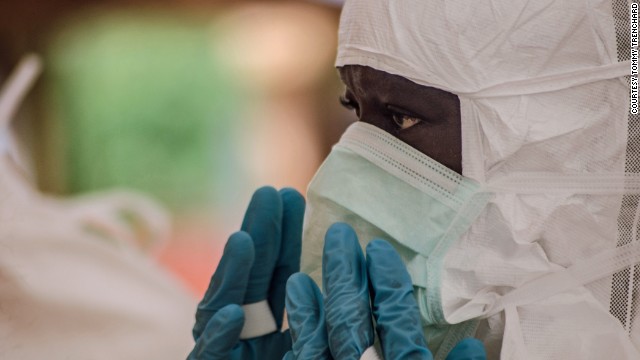 A doctor puts on protective gear at the treatment center in Kailahun, Sierra Leone, on Sunday, July 20.
A doctor puts on protective gear at the treatment center in Kailahun, Sierra Leone, on Sunday, July 20.  Members of Doctors Without Borders adjust tents in the isolation area in Kailahun on July 20.
Members of Doctors Without Borders adjust tents in the isolation area in Kailahun on July 20. 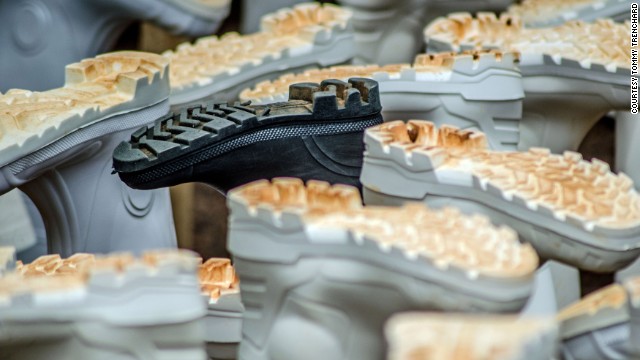 Boots dry in the Ebola treatment center in Kailahun on July 20.
Boots dry in the Ebola treatment center in Kailahun on July 20.  Red Cross volunteers prepare to enter a house where an Ebola victim died in Pendembu, Sierra Leone, on Friday, July 18.
Red Cross volunteers prepare to enter a house where an Ebola victim died in Pendembu, Sierra Leone, on Friday, July 18.  Dr. Jose Rovira of the World Health Organization takes a swab from a suspected Ebola victim in Pendembu on July 18.
Dr. Jose Rovira of the World Health Organization takes a swab from a suspected Ebola victim in Pendembu on July 18.  Red Cross volunteers disinfect each other with chlorine after removing the body of an Ebola victim from a house in Pendembu on July 18.
Red Cross volunteers disinfect each other with chlorine after removing the body of an Ebola victim from a house in Pendembu on July 18.  A dressing assistant prepares a Doctors Without Borders member before entering an isolation ward Thursday, July 17, in Kailahun.
A dressing assistant prepares a Doctors Without Borders member before entering an isolation ward Thursday, July 17, in Kailahun.  A doctor works in the field laboratory at the Ebola treatment center in Kailahun on July 17.
A doctor works in the field laboratory at the Ebola treatment center in Kailahun on July 17.  Doctors Without Borders staff prepare to enter the isolation ward at an Ebola treatment center in Kailahun on July 17.
Doctors Without Borders staff prepare to enter the isolation ward at an Ebola treatment center in Kailahun on July 17.  A health worker with disinfectant spray walks down a street outside the government hospital in Kenema, Sierra Leone, on Thursday, July 10.
A health worker with disinfectant spray walks down a street outside the government hospital in Kenema, Sierra Leone, on Thursday, July 10.  Dr. Mohamed Vandi of the Kenema Government Hospital trains community volunteers who will aim to educate people about Ebola in Sierra Leone.
Dr. Mohamed Vandi of the Kenema Government Hospital trains community volunteers who will aim to educate people about Ebola in Sierra Leone.  Police block a road outside Kenema to stop motorists for a body temperature check on Wednesday, July 9.
Police block a road outside Kenema to stop motorists for a body temperature check on Wednesday, July 9.  A woman has her temperature taken at a screening checkpoint on the road out of Kenema on July 9.
A woman has her temperature taken at a screening checkpoint on the road out of Kenema on July 9.  A member of Doctors Without Borders puts on protective gear at the isolation ward of the Donka Hospital in Conakry, Guinea, on Saturday, June 28.
A member of Doctors Without Borders puts on protective gear at the isolation ward of the Donka Hospital in Conakry, Guinea, on Saturday, June 28.  Airport employees check passengers in Conakry before they leave the country on Thursday, April 10.
Airport employees check passengers in Conakry before they leave the country on Thursday, April 10.  CNN's Dr. Sanjay Gupta, left, works in the World Health Organization's mobile lab in Conakry. Gupta traveled to Guinea in April to report on the deadly virus.
CNN's Dr. Sanjay Gupta, left, works in the World Health Organization's mobile lab in Conakry. Gupta traveled to Guinea in April to report on the deadly virus.  A Guinea-Bissau customs official watches arrivals from Conakry on Tuesday, April 8.
A Guinea-Bissau customs official watches arrivals from Conakry on Tuesday, April 8.  Egidia Almeida, a nurse in Guinea-Bissau, scans a Guinean citizen coming from Conakry on April 8.
Egidia Almeida, a nurse in Guinea-Bissau, scans a Guinean citizen coming from Conakry on April 8.  A scientist separates blood cells from plasma cells to isolate any Ebola RNA and test for the virus Thursday, April 3, at the European Mobile Laboratory in Gueckedou, Guinea.
A scientist separates blood cells from plasma cells to isolate any Ebola RNA and test for the virus Thursday, April 3, at the European Mobile Laboratory in Gueckedou, Guinea.  Members of Doctors Without Borders carry a dead body in Gueckedou on Friday, April 1.
Members of Doctors Without Borders carry a dead body in Gueckedou on Friday, April 1.  Gloves and boots used by medical personnel dry in the sun April 1 outside a center for Ebola victims in Gueckedou.
Gloves and boots used by medical personnel dry in the sun April 1 outside a center for Ebola victims in Gueckedou. 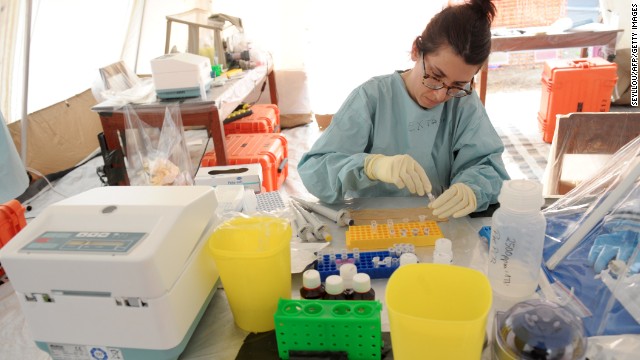 A health specialist works Monday, March 31, in a tent laboratory set up at a Doctors Without Borders facility in southern Guinea.
A health specialist works Monday, March 31, in a tent laboratory set up at a Doctors Without Borders facility in southern Guinea. 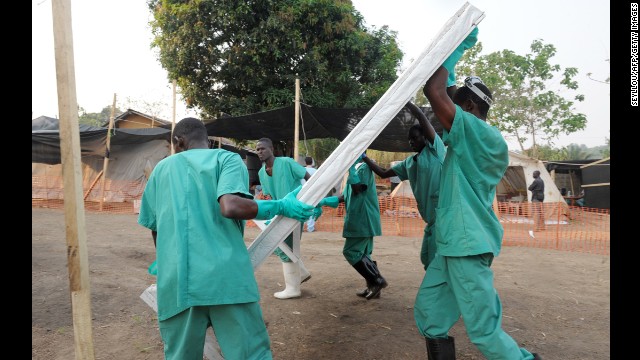 Health specialists work March 31 at an isolation ward for patients at the facility in southern Guinea.
Health specialists work March 31 at an isolation ward for patients at the facility in southern Guinea.  Workers associated with Doctors Without Borders prepare isolation and treatment areas Friday, March 28, in Guinea.
Workers associated with Doctors Without Borders prepare isolation and treatment areas Friday, March 28, in Guinea.
- NEW: Some encouraging signs seen in Nigeria and Guinea, the WHO says, but risk still high
- The number of cases reported this year increases to 2,240
- Guinea, Liberia, Nigeria and Sierra Leone have been hit by the virus
- The WHO has called for exit screenings of travelers from those countries
(CNN) -- The number of deaths from the Ebola outbreak in West Africa has climbed to 1,229, the World Health Organization said Tuesday, but it cited "encouraging signs" from Nigeria and Guinea that positive action can rein in the deadly disease.
The death toll increased between August 14 and 16, as 113 new cases were reported, raising the total number of cases this year to 2,240, the world health body said.
The information came from Guinea, Liberia, Nigeria and Sierra Leone -- the four West African countries hit by the deadly virus.
Despite the rising death toll, the WHO said that there were "some encouraging signs" in Nigeria and Guinea.
 Patients arriving at largest Ebola clinic
Patients arriving at largest Ebola clinic The situation in Lagos, Nigeria, where the first case was detected in July, "looks reassuring," it said.
"At present, the city's 12 confirmed cases are all part of a single chain of transmission. Those infected by the initial case include medical staff involved in his treatment, a patient in the same hospital, and a protocol officer in very close contact with the patient," it said.
No one on the same flight as the man who carried the infection into the country on July 20 was infected, despite him vomiting frequently on the flight and on arrival, it said. The man died July 25 and the 21-day incubation period has now passed, the WHO said.
Intensive efforts to track those at risk have not turned up any new cases outside the 12 identified.
One of those 12 has made a full recovery, the WHO said, which "counters the widespread perception that infection with the Ebola virus is invariably a death sentence." Evidence suggests early detection and therapy can help people survive, it said.
"The intensity of the search and monitoring effort raises cautious optimism that further spread of the virus in Nigeria can be stopped. The search for additional cases continues, as does the current high level of vigilance."
In Guinea, the situation is "is less alarming" than in Liberia and Sierra Leone, the WHO said, thanks to higher awareness and innovative efforts to contain the spread of the virus.
Community leaders have persuaded 26 villages that were resistant to outside help to cooperate, it said. As a result there has been a surge in reported cases -- but these are cases that were previously concealed, so they should not be seen as surge in infections.
But despite the positive signs, the WHO warned that the outbreak is not under control and that progress is fragile, with a real risk of another flare-up and the continued spread of the disease.
The WHO on Monday called on the affected countries to carry out exit screenings of travelers at international airports, seaports and major land crossings.
But it said it doesn't currently recommend travel restrictions and active screening of passengers on arrival in countries that don't have borders with the affected countries.
READ: Ebola facility in Liberia attacked; patients flee
READ: Ebola virus: Nine things to know
CNN's Nana Karikari-apau and Elaine Ly contributed to this report.
No comments:
Post a Comment